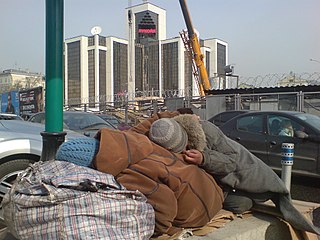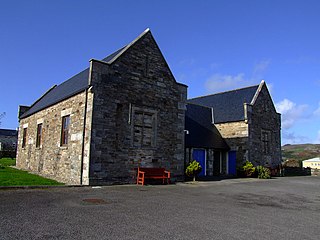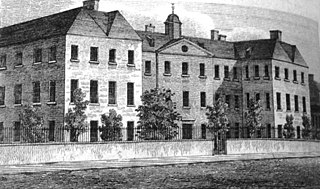
The English Poor Laws were a system of poor relief in England and Wales that developed out of the codification of late-medieval and Tudor-era laws in 1587–1598. The system continued until the modern welfare state emerged in the late 1940s.

In Britain and Ireland, a workhouse was a total institution where those unable to support themselves financially were offered accommodation and employment. In Scotland, they were usually known as poorhouses. The earliest known use of the term workhouse is from 1631, in an account by the mayor of Abingdon reporting that "we have erected wthn [sic] our borough a workhouse to set poorer people to work".

Pauperism is the condition of being a "pauper", i.e. receiving relief administered under the Irish and English Poor Laws. From this, pauperism can also be more generally the state of being supported at public expense, within or outside of almshouses, and still more generally, of dependence for any considerable period on charitable assistance, public or private. In this sense, pauperism is to be distinguished from general poverty or the state of being a poor, although the two concepts overlap.

The Poor Law Amendment Act 1834 (PLAA) known widely as the New Poor Law, was an Act of the Parliament of the United Kingdom passed by the Whig government of Earl Grey denying the right of the poor to subsistence. It completely replaced earlier legislation based on the Poor Relief Act 1601 and attempted to fundamentally change the poverty relief system in England and Wales. It resulted from the 1832 Royal Commission into the Operation of the Poor Laws, which included Edwin Chadwick, John Bird Sumner and Nassau William Senior. Chadwick was dissatisfied with the law that resulted from his report. The Act was passed two years after the Representation of the People Act 1832 which extended the franchise to middle-class men. Some historians have argued that this was a major factor in the PLAA being passed.
A poor law union was a geographical territory, and early local government unit, in Great Britain and Ireland.

The Andover workhouse scandal of the mid-1840s exposed serious defects in the administration of the English 'New Poor Law'. It led to significant changes in its central supervision and to increased parliamentary scrutiny. The scandal began with the revelation in August 1845 that inmates of the workhouse in Andover, Hampshire, England were driven by hunger to eat the marrow and gristle from bones which they were to crush to make fertilizer. The inmates' rations set by the local Poor Law guardians were less than the subsistence diet decreed by the central Poor Law Commission (PLC), and the master of the workhouse was diverting some of the funds, or the rations, for private gain. The guardians were loath to lose the services of the master, despite this and despite allegations of the master's drunkenness on duty and sexual abuse of female inmates. The commission eventually exercised its power to order dismissal of the master, after ordering two enquiries by an assistant-commissioner subject to a conflict of interest; the conduct of the second led to more public inquiry and drew criticism.

The Poor Relief Act 1601 was an Act of the Parliament of England. The Act for the Relief of the Poor 1601, popularly known as the Elizabethan Poor Law, the "43rd Elizabeth", or the "Old Poor Law", was passed in 1601 and created a poor law system for England and Wales.
The Poor Law Commission was a body established to administer poor relief after the passing of the Poor Law Amendment Act 1834. The commission was made up of three commissioners who became known as "The Bashaws of Somerset House", their secretary and nine clerks or assistant commissioners. The commission lasted until 1847 when it was replaced by a Poor Law Board – the Andover workhouse scandal being one of the reasons for this change.

In English and British history, poor relief refers to government and ecclesiastical action to relieve poverty. Over the centuries, various authorities have needed to decide whose poverty deserves relief and also who should bear the cost of helping the poor. Alongside ever-changing attitudes towards poverty, many methods have been attempted to answer these questions. Since the early 16th century legislation on poverty enacted by the Parliament of England, poor relief has developed from being little more than a systematic means of punishment into a complex system of government-funded support and protection, especially following the creation in the 1940s of the welfare state.
From the reign of Elizabeth I until the passage of the Poor Law Amendment Act 1834 relief of the poor in England was administered on the basis of a Poor Relief Act 1601. From the start of the nineteenth century the basic concept of providing poor relief was criticised as misguided by leading political economists and in southern agricultural counties the burden of poor-rates was felt to be excessive (especially where poor-rates were used to supplement low wages. Opposition to the Elizabethan Poor Law led to a Royal Commission on poor relief, which recommended that poor relief could not in the short term be abolished; however it should be curtailed, and administered on such terms that none but the desperate would claim it. Relief should only be administered in workhouses, whose inhabitants were to be confined, 'classified' and segregated. The Poor Law Amendment Act 1834 allowed these changes to be implemented by a Poor Law Commission largely unaccountable to Parliament. The act was passed by large majorities in Parliament, but the regime it was intended to bring about was denounced by its critics as un-Christian, un-English, unconstitutional, and impracticable for the great manufacturing districts of Northern England. The Act itself did not introduce the regime, but introduced a framework by which it might easily be brought in.

The 1832 Royal Commission into the Operation of the Poor Laws was a group set up to decide how to change the Poor Law systems in England and Wales. The group included Nassau Senior, a professor from Oxford University who was against the allowance system, and Edwin Chadwick, who was a Benthamite. The recommendations of the Royal Commission's report were implemented in the Poor Law Amendment Act 1834.
Boards of guardians were ad hoc authorities that administered Poor Law in the United Kingdom from 1835 to 1930.
The Minority Report was one of two reports published by the Royal Commission on the Poor Laws and Relief of Distress 1905–1909, the other being Majority Report. Headed by the Fabian socialist Beatrice Webb, it called for a system that was radically different from the existing Poor Law. She, amongst the others heading the report, who included George Lansbury, felt that it was shortsighted of society to expect paupers to be entirely accountable for themselves.
The Royal Commission on the Poor Laws and Relief of Distress 1905–1909 was a body set up by the British Parliament in order to investigate how the Poor Law system should be changed. The commission included Poor Law Guardians, members of the Charity Organisation Society, members of local government boards as well as the social researchers Charles Booth and Beatrice Webb.

The Irish poor laws were a series of acts of Parliament intended to address social instability due to widespread and persistent poverty in Ireland. While some legislation had been introduced by the pre-Union Parliament of Ireland prior to the Act of Union, the most radical and comprehensive attempt was the Poor Relief (Ireland) Act 1838, closely modelled on the English Poor Law Amendment Act 1834. In England, this replaced Elizabethan era legislation which had no equivalent in Ireland.
The Scottish poor laws were the statutes concerning poor relief passed in Scotland between 1579 and 1929. Scotland had a different poor law system to England and the workings of the Scottish laws differed greatly to the Poor Law Amendment Act 1834 which applied in England and Wales.
Social work as a profession dates back to years ago, with the first social welfare agencies appearing in urban areas in the 1800s. It has its roots in the attempts of society at large to deal with the problem of poverty and inequality. Social work is intricately linked with the idea of charity work, but must be understood in broader terms. The concept of charity goes back to ancient times, and the practice of providing for the poor has roots in all major world religions.
The following article presents a timeline of the poor law system in England from its origins in the Tudor and Elizabethan era to its abolition in 1948.
In 2002, nursing homes in the United Kingdom were officially designated as care homes with nursing, and residential homes became known as care homes.

The Scottish poorhouse, occasionally referred to as a workhouse, provided accommodation for the destitute and poor in Scotland. The term poorhouse was almost invariably used to describe the institutions in that country, as unlike the regime in their workhouse counterparts in neighbouring England and Wales, residents were not usually required to labour in return for their upkeep.









